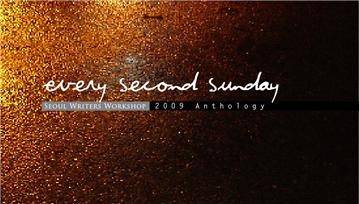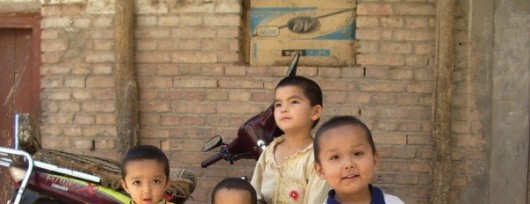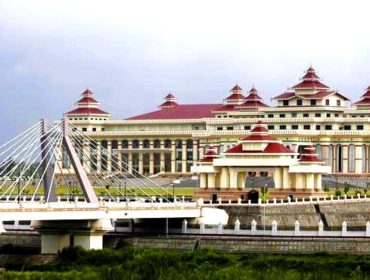By Penelope James
I’d been living in Australia for 8 months and I was bored and broke. Things weren’t working out. English First China said I could be on a plane, sorted with a flat and a visa and teaching the English within 10 days. Sure, why not, but where? I’d been to the east before and was pretty under whelmed; grey, built up, hyper consumerism. I’d been to Mongolia too and had been blown away; the steppe, the space, horizons, crazy dudes on horseback. I like remote, you never know who’ll blow into town. So, I figured as far west as possible. A clumsy calculation I realised, but it felt right. West had always seemed to work out best.
When I first arrived in Urumchi I didn’t really understand what an Uighur was. Muslim and ethnically Turkic that was about all I knew. Within two weeks I had fallen in love with one. He was tall and strong, with thick black hair and grey blue eyes – like a wolf. But he was sad. Sad because he wasn’t Chinese but his identity card said he was. The card that spelt his name incorrectly, and had his birth date wrong. The card he frequently had to produce to armed police, as they patrolled the run down streets of his neighbourhood.
He told me that I was in East Turkestan not Xinjiang. I could see that I was. The best kebabs; lumps of sheep skewered and cooked out in the streets, chaotic markets selling Turkish like carpets and knives and furs, young boys baking flat nan bread in clay ovens calling out as they vied playfully for trade, old arched doorways, winding alleys, mosques, street music, the bustle and the hustle; life on the streets. I loved it. These streets however, were being swallowed up. Swallowed up by migrant Han and the greed of development. Turn the corner and you were back in China. Rip off electronic shops, shopping malls blaring generic techno, ditsy Hello Kitty like tack. Two cultures living in one city. Distrusting and disapproving of each other and divided on every level; even time. The Han and commerce, operating on Beijing time, the Uighur and the sun, operating two hours behind on Xinjiang or local time.
Urumchi is the furthest city in the world from the sea. It’s a four hour flight from Beijing and a four hour flight from Moscow. Its surrounding scape is extreme. Near the Kazakh border it is surrounded by the Tien Shen mountain range; its white peaks providing a backdrop to the city. To the south the Taklamakan Desert. It’s in the province of Xinjiang translated literally as ‘New Frontier’. Xinjiang is huge: it shares borders with Russia, Mongolia, Kazakhstan, Kyrgyzstan, Tajikistan, Afghanistan, Pakistan and India; it is the heart of Asia. Formally East Turkestan the Chinese took it apon themselves to ‘liberate’ it in 1949 and in 1951 it was declared the Uighur Autonomous Region of China.
I spent a year living and working in Urumchi. Part of me never wanted to leave and a part of me I left there. Unaware at first, but as time went by, the sadness that I had first seen in him I began to see in others. Sometimes it seemed to hang like a cloud over the whole city. As I made more friends I heard more stories. Stories of children being beaten in school for speaking Uighur, not Mandarin, of passports being confiscated and never returned, of people losing jobs or never getting them, of people disappearing. I began to see the poverty of an oppressed people. Grown men unable to work with nothing to do. The humiliation of oppression is toxic. You don’t see it at first but it permeates everything. Your powerless against it and resigned to just carry on with life as normal. Or not, as recent events have shown.
On the 5th July 2009 I woke in my flat in Seoul and like any other morning brewed coffee and logged onto the obligatory Facebook. A friend who I had shared a few litres of tequila with during my year in Urumchi had posted a YouTube link. I opened it. It was footage from someone’s mobile. Shaky and around three minutes long, it was taken from a flat window and looked down on a crowd of maybe 200 marching through the streets. What were they shouting? It was difficult to make it out. Uighur? Yes, they were shouting Uighur, Uighur, Uighur. Stunned. I tried to let what I had seen sink in but it still hasn’t really. I spent that day wondering what was happening and how the Chinese were going to respond to this brave yet reckless show of defiance.
*http://www.youtube.com/watch?v=Y-EVRZEUyCM&feature=related
The next morning I woke and listened to The BBC World Service. Urumchi was the main story. The top headline. Urumchi; my second home, a place I love and a place few had ever heard of. It was strange to hear reporters saying the words, that when I had spoken them, had been met by blank expressions; Uighur, Urumchi, Xinjiang. That day I spent listening to the news and searching for any information that I could find online. I learnt that the protest had been triggered by the arrival of news back to Xinjiang that 2 Uighur migrant workers had been killed in a vicious fight with Han migrant workers at a factory in Guandong, a city in the south of China.
Seeing Urumchi on the news I could transport myself there to the streets that I recognised and knew so well. It was summer. I could smell it and feel that heat. Simmering alongside the resentment, anger and humiliation that had been bubbling away for generations. I watched news reports online. The protests were now full on riots. Bloody riots. And they were happening right where my friends lived. I was searching the faces compelled and horrified. There were tanks, blood, the number of dead growing with each report soon into the hundreds. That day my heart broke and its never felt fixed since. Where was he? Were my friends safe? Late into the night I heard that soldiers had rounded up 1400 Uighur men. I could see the very doors they were kicking down. The mothers and sisters and wives pleading and screaming no. But worse than that I could see the very men they were dragging from their beds and bundling into the back of vans. I felt desperate. Where was he?
The following days I spent in a daze. I was a wreck. I hated being away from my computer. My only hopeful link to Urumchi and news. I sat and watched images of burnt out shops and homes, a woman standing in front of a tank screaming and demanding for her men back, revenge attacks with homemade weaponry. More blood, more dead, more rounded up. I sent scores of emails and repeatedly telephoned any numbers I still had desperately trying to make contact with someone there. My Urumchi friends living away were doing the same. Heartbreaking pleas on Facebook for news of loved ones. The lines were down and all internet access blocked. The city was on lockdown.
That was over 6 months ago now. If I had known then that I would still be unable to contact my friends in Urumchi I don’t think I would have been able to cope. The Chinese government has maintained a complete block on the internet throughout Xinjiang and phone lines are still down. This Autumn I watched on the news as Obama toured China. Grinning and bowing and talking trade. Nothing on the hundreds maybe thousands still missing, or the fact that a province twice the size of France is living in a complete communication blackout. I felt real anger with the world, and then just sobering disappointment.
Thankfully some news has got out. Word from friends of friends: snippets here and there. It was sometime in September that I received an email from him. He was alive and safe. I was elated. He was depressed. Visiting a city in the east for a few days he was able to access his hotmail account. We exchanged several messages. He told me that life was much worse than before. He couldn’t go into details. He asked me what the outside world thought. “Does everyone know about Uighurs now?” he wrote. “Yeah, lots of people. It was big news” I replied. The ‘was’ staring back at me from the computer screen. “People don’t care do they?” he later asked. “They care about Tibet. Why not us? Its because we are Muslim, they see that and think we’re terrorists, don’t they?’ I didn’t lie to him.
**
http://www.youtube.com/watch?v=tfV6mH4geAI
penelopejames@hotmail.com
By Haerin Shin
There are myriads of Korean legends on the theme: “the bride in waiting.” These stories often come from times of social turmoil, when men had to leave their homes for war, for “greater causes”… The stories embedded in what we read in our history textbooks, quietly but persistently murmur the tales of those whose lives remain untold. Female tears and sighs buried in endless years of waiting, youth and life slipping through the petrified fingers of young brides, no one noticing the bright cherry glow on their cheeks slowly fading away….
My grandparents met for the first time on their wedding day. Was there love? Or, could there have been love. I can only guess, or for their sake, hope, for neither of them remained in this world long enough to give me a straight answer. Grandmother stayed home tending to household chores and raising children, as all good Korean women did in those days, while my grandfather, a politician and government official, plunged into the task of resuscitating a battered nation.
My grandparents’ generation lived through the most tumultuous days of modern Korean history. They spent their youth under the terrorizing reign of the Japanese colonial government, their long-awaited joy of liberation only to be shattered by the continuation of horrors in the Korean War. At the same time the tattered hope for peace and a return to tranquility became nostalgic as they were swept away in the storm and stress of industrialization.
In my earliest memories of my grandmother, she was always lying in bed, half paralyzed, as the aftermath of a stroke she had suffered when I was still a toddler. Nevertheless, she was the best grandmother one could ever wish for: generous, patient, and conveniently distant. Upon every visit, she would shower me with candy, little trinkets, and if I was lucky enough, shiny stiff paper bills. I would give her my little girl hug and run out, waving my trophies in excitement while she watched, twitching her twisted lips in quiet chuckles. I have no memories of her ever talking more than a few minutes – perhaps it was because of the physical toil she had to exert in order to organize and voice any long, logical sentence. But for such a bundle of mischief that I was, it couldn’t have been better, for less talk meant greater chance of getaway. She was never the one to yell at me for tripping over a carefully laid out tea table for some important guest, or launch into a lengthy tirade on the importance of grades. She was part of the scenery, serenely lying in wait for the warmth of someone’s touch, a pleasantry to brush away the pains of her bedsore.
But from others, I’ve heard differently. I remember my mother complaining about how grandmother could at times be so demanding and irritable. Her tea arriving a few minutes too late after she had rung the bell, a scrap of paper misplaced, or even the subtlest changes in the taste of her usual gruel would send her into fits of rage, mother would tell me with a shudder. I remember seeing mother huddled in a heap in the back kitchen trying to repress her sobs after a particularly bad day with the “old tyrants mood swings. My father was the only son in the family, which apparently means a lot in Korea’s patriarchal society, but he never got what only sons usually expect from their mothers; he used to tell me horror stories about how grandmother would make him spend nights camped out in the garden with her in the freezing cold, when grandfather was imprisoned by the opposing party after some bloody coup… she would tell this little boy, who barely understood what was going on, that as the sole heir and future head of the family, he had to suffer as much as his father did. He had no right to sleep under warm covers while his father was pining away on the cold, hard floor of a cell. I was baffled by the discrepancy between her attitude towards me and my parents; I used to ask her why she wasn’t as nice to my parents as she was to me, what made her so angry at them. What made her lash out at her closest blood kin, when she was so gentle and patient with her husband (well, I guess I wasn’t really sure how true that was, since he was never really around) and her grandchild. She would fall silent, and turn her gaze to the wall… I never got a clear answer from her, I may have heard her muttering, “but then, who else is there? Who else…. was there?” but I do remember once seeing a gleam of light reflected from her eye in the afternoon sun. As if her black, impenetrable retina was a shard of a broken mirror… I remember thinking, how pretty, but…wait, is that…? Just then some guest stepped into the room, and she instantly recovered her usual dignified equanimity. That brief moment of intimacy was never to be revisited.
When I was older, probably in high school, I had a chance to sit down by her and confess my ambition to study literature, to become a writer. She was encouraging, even excited, I could tell. “Guess all the artsy stuff went to the women in this family,” she chuckled, “perhaps you can use some of my paintings for your book?” I was flattered. After all, bedridden as she was, she used to be a fairly well-known calligrapher. “You know, I used to love reading too, before I…” she fell silent again. Unwilling to let go of that rare glimpse of buoyancy I had seen, I asked her what her favorite poem was. A flicker of light returned to her face, and without a moment’s hesitation she told me to go home and look up Jeong-ju Seo’s “The Bride.”
Here’s how that narrative goes:
On his wedding night, a groom decides to go out for some fresh air, to gather his thoughts and prepare himself before lifting the veil that conceals his bride’s face[1]… At the threshold, he senses a tugging, and thinks his bride is trying to hold him back. This would be a serious breach of norms—women were supposed to be demure and passive and never show any signs of affection or desire. So the groom gets mad at this perceived offense and simply walks away without even once looking back. (Here, the imagination of the bard wanders off; maybe the groom had a secret lover and was upset with being forced into this marriage from the start. Maybe, being yet in his teens, he was going through one of those rebellious stages, resenting the shackles of familial duties looming ahead the horizon. But the tale must go on…) Years go by; a fine layer of frost sets in our protagonist’s hair, and his once-smooth face begins to display traces of the relentless brush of time. Grown tired of adventures and excitement, he returns to his native village, yearning to see the places he had roamed as a young, sprinting lad. He comes across the house he had left behind on the night of the wedding ceremony, dilapidated but still holding its ground. Memories of the fateful moment that triggered his long exile burns through his veins; he can’t resist, he decides to take a peek. Cautiously, he approaches… carefully, he places his hand on the doorknob…wait, what is this? A faint flitter of something white. A shred of cloth, a small piece of lace trimming wrapped around a nail head sticking out of the doorframe… Suddenly, everything clicks into place, it was never her, it was his own blunder all along… With tides of remorse sweeping through his entrails, he ventures a timid push. The door creeks open. And there sits his bride, with her veil still drawn over her face, demure as ever, hands clasped together on her lap, chastely waiting for her husband to return… He steps forward. A gentle breeze follows him through the door… and as he stretches out his hand to lift the veil for the very first time, with a slight tremor, as if letting out a long-suppressed sigh, the bride disintegrates into a heap of ash.
Click here to read Part II
Haerin Shin (Helen) is currently in Stanford Univ.’s Ph.D. program (comparative literature), Helen works on contemporary fiction in the US, Japan and Korea, focusing on topics such as psychoanalysis, memory and history, ghost theories (boo), and transnationalism. In love with all the cool stuff – science fiction / fantasy, anime, graphic narratives, ghosts (but of course)….name it!
Comments
comments







